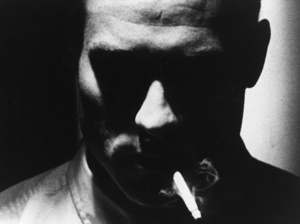 
|
|
|
|

|
 |
 |
International Film Festival, Mannheim-Heidelberg
The thumbprint still inscribes the International Film Festival of Mannheim-Heidelberg, set at twin cities on the Neckar in Germany’s Rheinland. Now in his 7th year as fest director, Dr. Michael Koetz continues to stress the art of "telling each other stories through cinematic means." Foremost is the narrative, even when it comes to documentaries (which this year totaled five features in separate competition alongside 13 fiction films). And overall, what constitutes a "signature" film is lyricism. Small and personal stories with a plaintive voice were the prize winners in fiction and non-fiction alike. Abandoned sons and lonely men, fragile friendships and tenuous bonds to family and culture paid tribute to the French New Wave while updating its themes.
 |
| Derek Cianfrance's Brother Tied. |
While autobiodocs such as Fatherless (Titinaki-Jidai, Japan), In My Father’s House (Fatima Jebli Ouazzani, Netherlands), and Pia’s Story (Basile Sallustio, Belgium) shored up the indelible stigma of paternal negligence and dominance alike, often resulting in cultural dislocation, fiction films focused on the tender ties that bind, for better and worse. The most masterfully stylish among these was Brother Tied by Derek Cianfrance (USA). As elliptically poetic as it is classically tragic, the film swells with a baroque language of slow motion sequences, non-diegetic voices, freeze frames, and cross-cutting "mind screens" that all but transcend the racial and sexual animosity eating away the sibling bond. According to Cianfrance, the point was to make a visual story in which the image plays the role of the word and to explore characters by seeing them as physical beings – skin as skin, a body’s movement, a hand on a shoulder – all of which are open to interpretation. Brother Tied is a good example of what Mannheim stands for – "personal" filmmaking in the auteur tradition. I asked Cianfrance if he saw the festival circuit as positioning him for his next project. "I look at it as a slow burn. It took four years to make this film, and it played the festivals for another year and a half, picking up six awards. We’ve written our next feature over the last year, and now we’re deciding on a producer."
Frederic Fonteyne (Belgium) won the best theatrical feature award for his decidedly lyrical Max et Bobo, a laughter-through-tears ode to two picaros whose only true demise is the suppression of their need for each others’ affection. Clearly indebted to French New Wave in its low-key content and stylistic virtuosity, Let’s Get Lost (Denmark) was another festival favorite. Writer-director Jonas Elmer wears nonchalance with verve in presenting four playful derelicts. "I wanted to create people, not characters," he claims. A hand-held camera, available light, location shooting, and improvised dialogue deliver a cascade of day-in-their-life sequences with a breezy insouciance that recalls Truffaut, Godard, and Antonioni as well.
At the most esoteric end of the lyrical spectrum was Andrej Slabakoff’s Bulgarian ghost story, Wagner, which used the stark B&W interiors of a factory and a panel-style workers’ apartment to pack a sardonic satire of Christianity, bureaucracy, and codified aesthetics.
While in its 47th year Mannheim-Heidelberg claims a compromise-free slate of non-commercial cinema, paradoxically it strives more than ever to expand its Market Service for buyers, distributors, and programmers, and its "Mannheim Meetings," held at the festival as one-on-one co-production negotiations. One success story here is Los Angeles-based Lorenzo O’Brien’s agreement, achieved at the festival last year, to make Teenangels with three co-producers in Spain, France, and Mexico. The "Mannheim Meetings" rotate their regions of focus each year, and may once again focus on U.S. independents in the future, asserting the festival’s role in promoting artistic cinema.
-
Venice International Film Festival by Belle Burke
Toronto International Film Festival by Ray Pride
Marco Island Film Festival by Brandon Judell
Fort Lauderdale International Film Festival by Stephen Gallagher
Tacoma Film Festival by Liane Bonin
International Film Festival, Mannheim-Heidelberg by Diane Sippl
Hawaii International Film Festival by Mike Jones
London Film Festival by Laura Macdonald
Shorts International Film Festival by Amy Veltman
CinemaTexas by Holly Willis
back to top
home page | subscribe | merchandise | history | order form | advertise | contact
archives | links | search
© 2005 Filmmaker Magazine